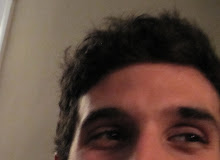
"Herman Melville's Breakfast" Oil on Panel, 24" x 22", 2010
This painting explores the role of the great American Novelist as masculine hero. Melville: steeped in Nineteenth century mannerisms, biblical allusions and an encyclopedic knowledge of all things leviathan, is seen as a graphic, unmoving fixture, overlapped by swordfish on a salmon-pink color block. The text is meant to recall a greasy spoon-style aesthetic. His eyes are narrowed with purpose and he is seen in the grand, posthumous esteem that history demands. There is something magical about the language of Moby Dick, how it circles itself, rambles on and yet delivers great humor with every observation. Take this line, from Chapter 65 (The Whale as Dish):
"It is not, perhaps, entirely because the whale is so excessively unctuous that landsmen seem to regard the eating of him with abhorrence; that appears to result, in some way, from the consideration before mentioned: i.e. that a man should eat a newly murdered thing of the sea, and eat it too by its own light."
In a chapter that begins with descriptions of barbecued porpoises and whale brain recipes, he goes on to talk about cannibals and ends with a rant about the evils of foie-gras. This chapter and some of the scenes that take place at the Spouter Inn (Queequeg harpooning steaks, over the heads of his table-mates) inspired this painting, which ended up being somewhat hindered by the nagging notion that Melville's appetite may be too big for just one painting. Or at least that's what I'd like to think.
"Loomings broadside" letterpress and polymer plate print, 10" x 14" 2006
On a related note: I recently dug up this broadside of the first paragraph of Moby-Dick , that I handset and printed on the VanDerCook at Dolphin Press during my MICA days. The illustration is meant to seem vaguely nautical; a sort of lighthouse, oar and steering wheel-in one. The form of the Broadside is a fun challenge- somewhere between poster and illustration.




